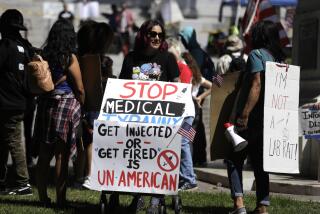Scientific Group Wages Crusade to Ease Food Safety Concerns
- Share via
“Our Food Supply Is Safe” was the headline of a full-page advertisement that ran in three major newspapers Wednesday. Signed by 65 scientists, it went on: “There is no scientific merit to charges that pesticide residues in our produce cause cancer in human beings.”
The paid statement was the latest effort of a little-known but frequently quoted science group that has been waging a high-profile crusade to counteract environmental groups’ concerns about food safety.
Representatives of the New York-based American Council on Science and Health have been on the media circuit the last several weeks trying to persuade the public that Alar, a chemical used on apples, is safe and should not be banned.
Calling itself a “consumer education and advocacy group,” the organization held a news conference in New York on Wednesday to highlight the signatures of 65 scientists who agree with its view that Alar is not a serious health threat and should not be listed as one by the U.S. Environmental Protection Agency.
“We believe the (environmentalist Natural Resources Defense Council’s) attack on food is the most significant and damaging attack on consumer confidence in our food that has happened in our lifetime,” said Elizabeth Whelan, an epidemiologist who founded the American council 10 years ago.
Whelan’s ability to attract media attention has alarmed many environmentalists, who say the organization’s title is misleading and its science faulty. Lawrie Mott, an NRDC scientist, worries that the American council’s statements might confuse people who do not realize “that scientists are just as likely to get embroiled in political debates as anyone else.” A representative of the Coalition Against the Misuse of Pesticides, an environmental group, calls the American council “industry attack dogs.”
Whelan said her organization receives up to 35% of its funding from corporations. Contributors include Uniroyal Chemical Co., the manufacturer of Alar, and the National Agricultural Chemicals Assn. Most environmental groups receive financial support mainly from dues-paying members and private foundations.
The group wins praise for its efforts to publicize the hazards of smoking but has raised eyebrows with its contention that saccharin, an artificial sweetener, is safe and does not cause cancer, that there is no evidence that the herbicide 2,4,5-T, an ingredient of the defoliant Agent Orange, causes birth defects, and that cyclamates, red dye No. 2. and EDB, a pesticide that was used on grain, should never have been banned.
Critics contend that many of the council’s scientific advisers have worked for or received grants from drug, chemical and other manufacturers whose products the council defends. For instance, Robert P. Upchurch, a professor of plant science at the University of Arizona who signed the council’s Alar statement, said in an interview Wednesday that he worked for 10 years for Monsanto Co., which manufactures pesticides. Whelan scoffs at the charges of conflict of interest, saying “all money is industry money” and insisting that she does not ask her scientific advisers about their finances.
Her group’s views, in fact, are shared by many scientists. They argue that the potential hazards of such chemicals as Alar are overstated in proportion to natural carcinogens found in food; that health threats, like smoking and AIDS, dwarf any peril from pesticides, and that basing regulations on animal studies is inappropriate because animals and humans do not always react the same.
The EPA is expected to ban Alar based on experiments with mice. Albert Heier, an EPA spokesman, said that extrapolating cancer data from animal experiments is “controversial” but “that’s the best we’ve got.”
The American council’s advertisement appeared in the New York Times, USA Today and the Washington Post. Whelan, who has appeared on several television news shows in recent weeks, grumbles that she still has not received as much attention as Meryl Streep, who has lobbied for tougher pesticide laws.
“We have petitioned the Donahue program and ’60 Minutes’ to send a representative,” she said.
More to Read
Sign up for Essential California
The most important California stories and recommendations in your inbox every morning.
You may occasionally receive promotional content from the Los Angeles Times.













